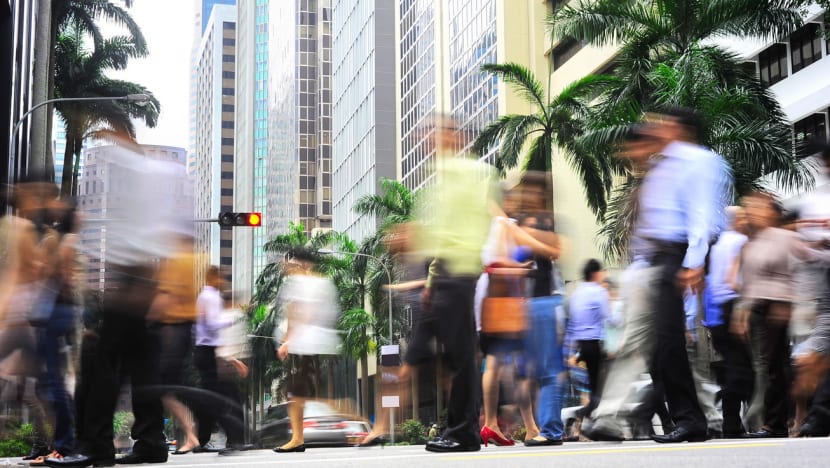Commentary: Maskless coughs and sneezes show we haven’t learnt anything from the COVID-19 pandemic
“Stay home and wear a mask if unwell”. This message has been drilled into us countless times since the COVID-19 pandemic, but yet there are countless anecdotes of people not doing so. CNA's Alison Jenner looks at whether social responsibility has taken a backseat in the endemic phase.

File photo of people crossing a street in Singapore. (Photo: iStock/joyt)
SINGAPORE: I settled down into one of the empty red chairs outside a Taekwondo school, looking forward to an hour of catching up on Netflix programmes undisturbed while my eight-year-old kicked and punched it out in class.
That peace quickly evaporated as another parent plonked himself nearby, clearly ill.
Every few seconds, he would snort loudly as he forcefully cleared his nasal passage. It made a wet, gurgling sound, the mucus sucked through his nostrils and sliding down the back of his throat. This was followed by a series of deep guttural coughs.
If reading this makes your stomach turn, imagine sitting next to him. The man didn’t have a mask on, nor did he cover his face when he sneezed or coughed. He just let it all out.
I debated fishing out a mask from my bag to give to him. But I didn’t, because I was too shy to make things awkward with someone I’d likely bump into every Saturday. I discreetly moved a couple of seats away from him.
Two days later, I woke up with a lump in my throat. I spent the next few days in bed with a high fever, a perpetually blocked nose, and the feeling of someone having sandpapered my throat.
Maybe I had caught a bug from that man, maybe it was pure coincidence. But that encounter highlighted to me how social responsibility - once a priority during the pandemic - has taken a backseat in the endemic phase.COVID-19 LESSONS GONE TO WASTE?
Three years after the arrival of COVID-19 - and the pain of a circuit breaker, shuttered businesses, home-based learning and social distancing measures - have we forgotten what we had learnt?
Why are people who are unwell not staying at home? And if they must absolutely go out, why are they not wearing a mask?
Singapore stood down practically all COVID-19 restrictions and downgraded its disease alert to the lowest level in February as it established a new endemic norm. In the weeks after, many people were still conscientious about public health, continuing to wear their masks even when it wasn’t compulsory.
Two months on, there has been a noticeable decline in social responsibility. Friends and colleagues complain of commuters coughing and sneezing, unmasked on buses and in trains, and people who insist on putting in face time in the office when unwell.
The consequences of decreased social responsibility are significant. COVID-19 or not, even a mere flu bug can take someone out of work or school for several days. A friend who teaches in a secondary school told me that he has seen an increase in absenteeism, with more than 10 students in his class absent on the same day recently.
EMERGENCE OF OMICRON SUBVARIANT ARCTURUS
Infections put our children, the elderly and the immunocompromised population at unnecessary risk, and undue pressure on the healthcare system.
While the number of hospitalised COVID-19 patients is currently far below the peak of the pandemic, it has gone up from 80 to 220 over the past month, said Health Minister Ong Ye Kung in a speech on Friday (Apr 14). He added that Singapore has been in the middle of a COVID-19 wave over the past month.
The emergence of new variants may pose a threat to the progress Singapore has made over the last three years.
The World Health Organization (WHO) is currently keeping a close eye on a new COVID-19 Omicron subvariant XBB.1.16 - nicknamed Arcturus - which has fuelled a recent surge of cases in several countries. It has been detected in about two dozen countries, including Singapore, India, the United States, the United Kingdom and Australia.
XBB.1.16 is “one to watch”, Maria Van Kerkhove, WHO’s technical lead for COVID-19, was reported as saying at a recent briefing. Researchers say XBB.1.16 has an additional mutation in the spike protein, which makes it more infectious.
Dr Vipin Vashishtha, a paediatrician and former convenor of the Indian Academy of Pediatrics Committee on Immunization, said he has noticed a new symptom in his patients not seen in previous COVID-19 waves - itchy conjunctivitis, commonly known as pink eye, without pus but with sticky eyes.
FRESH WAVE OF INFECTION IN SINGAPORE
In Singapore, the current COVID-19 wave is being driven by multiple variants XBB, XBB.1.5, XBB.1.9, XBB.1.16, XBB.2.3, BN.1, CH.1.1, but without a clear dominant strain, said Mr Ong on Friday. There has been no evidence showing that any of the current XBB strains cause more severe illnesses.
Official data shows that the number of COVID-19 infections spiked to 28,410 cases in the final week of March, almost double the previous week's 14,467 cases.
The actual number of cases, however, is likely to be higher as MOH no longer imposes mandatory testing, and official case numbers are estimated based on the National ARI (Acute Respiratory Infection) Surveillance Programme. Many people are also choosing to recover at home on their own, and do not get tested.
Clinics in Singapore said they have seen a spike in patient load as well as patients seeking medical treatment for influenza.
When my family went to a doctor on Tuesday morning, we waited three hours for our turn, with 30 other patients in the line before us.
HAVING TO PAY FOR COVID-19 TESTS AND TREATMENT
As part of Singapore’s move to the endemic phase, financing support for COVID-19 testing and treatment was scaled back and realigned with that of other acute illnesses from Apr 1.
COVID-19 patients admitted to a C-class ward might pay up to S$700 (US$528) after subsidies and tapping MediShield Life, Senior Parliamentary Secretary for Health Rahayu Mahzam told Parliament in February. The cost of COVID-19 treatment for subsidised patients at polyclinics is about S$20 to S$35, similar to other acute respiratory diseases.
Several private clinics I called to enquire about COVID-19 testing charges quoted S$10 to more than S$50 for an Antigen Rapid Test, excluding consultation fees, medication, and Goods and Services Tax. Three clinics said they did not offer COVID-19 testing.
It makes me wonder if this might have larger implications for infection control for the wider community. Have residents become so accustomed to free self-test kits, swabs and treatment that they might now be less inclined to get tested or seek treatment if they have to pay for it?
As pandemic restrictions and requirements slowly lifted over the past year, the message that keeps repeating is that social responsibility lies on the individual.
We’ve been taught that if we are unwell with respiratory symptoms, we should stay home or wear a mask to minimise the possibility of infecting others. In an ideal world, everyone would be socially responsible. But for whatever reason, there are some people who just aren’t.
Only by collectively taking responsibility can we mitigate the spread of COVID-19 and other infections. Let’s not let old habits start flowing back.
Alison Jenner is senior editor at CNA Digital where she oversees commentaries.




















